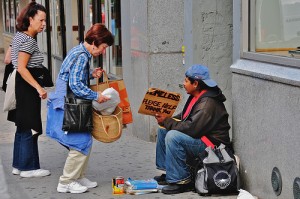It’s official. The still unresolved BP accident in the Gulf of Mexico is now the biggest environmental disaster in U.S. history. Yet, could this also be an opportunity, a momentum-builder for constructive dialogue, about our relationships, with each other, and nature, and a bottom-line where everything connects? I hope so.
When we aren’t connected
For me, BP in the Gulf is a story of failure of connection, of failure in:
- Relationships, and how you (e.g., representing a large multi-national) and I (e.g., an independent fisherman) will live together
- Sustainable practice; doing what’s good for profit, and the environment, and society
- Systems thinking; respecting unpredictability, and letting go of the idea that we can control it all
When we connect people who are different
Many years ago, I lived in Toronto when John Sewell was city mayor. He was not your typical mayor. He would take senior bank executives on walking tours of the city, connecting them with the less fortunate folks a reality check of sorts. Why do that? When we get to know each other, we just might clue in, and see that, hey, we aren’t so different after-all! We share basic needs. When we get-together we may also discover other things we have in common, better understand the impact of our actions, find ways to bridge differences, and build the trust necessary for joint problem-solving. You can’t hate someone whose story you know.
When we connect people with nature
In between BP media reportage last week, I listened to a news story about using beekeeping as therapy.
Sweet Beginnings, a company in Chicago, is a wholly owned subsidiary of the North Lawndale (Chicago) Employment Network. They provide a 3-month, full-time transitional job, to ex-cons and others with significant barriers, in a green industry the production and sales of bee-related products. Apparently, working with bees is also great for anger-management!
And how about working with horses for sexual trauma healing, elephants for autism disorders; not to mention dogs for treating depression, and just about everything else! Whether interacting with animals, gardening, or exploring remote wilderness. We can learn from nature, about living systems, adapting for survival, structures to emulate.
When we let natural systems be
Carl Pope, Sierra Club chair, talked about re-connecting natural spaces in his recent blog post. As climate disruption accelerates, natural systems are our first line of defense. Ecosystems can adjust to — and help human communities weather — chaotic climate. But they can do so only if we give them space — connected space. His post specifically refers to re-connecting parts of the Florida Everglades.
I, too am thinking about how we create wildlife corridors for Rocky Mountain grizzly bears, and consider the impact of a major new North America pipeline on indigenous peoples and migrating caribou.� When we alter the natural environment, how sure are we of outcomes? Maybe it’s best if we worked more with what’s given!
My question to BP
You brand yourself as “Beyond Petroleum”. Looking ahead, what will you have learned, from the Gulf disaster, about connection and relationships? What (new) talk will you walk towards? (Feel free to answer on behalf of BP!)
If you enjoyed this post, please consider leaving a comment or subscribing to my blog. Thanks, Ben.
Photo credit: Ed Yourdon on Flickr


Ben,
I also wrote about the BP spill from a collaboration standpoint in, BP Oil Spill – Unmitigated Disaster in Collaboration, at: http://allcollaboration.com/home/2010/5/27/bp-oil-spill-unmitigated-disaster-in-collaboration.html
Regards,
Lokesh Datta
http://www.allcollaboration.com
Twitter: @LDatta
Nice post. I agree with you in your comment about systems thinking that we cannot control it all. What’s really frustrating, though, is when we don’t even come close to managing things as well as we could. In other words, when we have a disaster like the BP oil spill, we’re usually able to see that what went wrong was, in fact, well within the company’s control. Many companies simply do not keep their control processes in proportion to the risks they’re taking. Such was the case with BP, and such was the case with the Wall Street firms that created the financial disaster. I wrote an article on this today, in case you’re interested. Cheers!
http://ragingcapitalist.blogspot.com/2010/06/importance-of-systems-thinking.html
Thanks Pat. Sorry for the delay in responding. I’m glad you’re weighing in on the BP mess-up… Your point about the importance of systems thinking as a risk management strategy is an excellent one. Better to apply systems thinking before vs. after the event! I’ll check out your post too.
John Sewell is not the progressive he protrays himself as you just have to look at http://www.ontariotenants.ca/taxes/tax001.phtml
Jim… My personal memory of Sewell is limited to his time as Mayor of Toronto. That was many years ago. So, interesting to see your article, which pertains to 20+ years later.